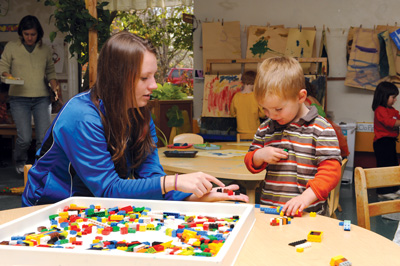
Clinically rich experiences.
That’s where the emphasis is today in teacher preparation programs at colleges across the nation that prepare the next generation of pre-kindergarten to grade 12 (PK-12) educators.
“We’re all being asked at the national level to integrate intentional clinically rich experiences across our teacher education programs,” said Christine Givner, dean of the College of Education at SUNY Fredonia. It’s a central feature of President Barack Obama’s Race to the Top initiative to spur innovation and reforms in PK-12 education while also transforming teacher and educational leader preparation.
There’s no need to convince Dean Givner that multiple field-based experiences are of immense value. She had embraced the concept well before she became founding dean of the College of Education in 2004. In fact, intentional clinically rich field experiences prior to student teaching were already in place at SUNY Fredonia.
Before embarking on student-teacher placement, students have the opportunity to complete four to five field experiences so they can observe how teachers and students interact, use their own knowledge and creativity, and develop skills to help students learn. Each field experience is partnered with a related college course.
“The fact that our field experiences are connected to courses, and not done in isolation, provides ‘theory to practice’,” said Fredonia’s Office of Field Experiences Director Ann Marie Loughlin. “The linkage better prepares them as educators. The improvement from freshman to senior year is evident when you witness the confidence and readiness of our student teachers.”
Developmental field placements that begin in the first year and continue across the program prior to student teaching have been a vital part of Fredonia’s teacher preparation for more than 20 years, Givner noted, and the highly renowned Fredonia-Hamburg (N.Y.) Teacher Center program is now in its 41st year.
Partnerships between the College of Education and individual school districts make these developmental field experiences possible. “We try to meet the needs of our school district partners, so each partnership fulfills a different kind of school-based need while fulfilling the instructional practice needs of the teacher candidates. We ask our partners to tell us what would be of help for them in order to craft a field-based course in their school that is a win-win situation,” Givner explained.
Clinical experiences typically last a full semester and are conducted at all school levels throughout Chautauqua and Erie counties.
Senior Jennifer Smith, who is majoring in Childhood Inclusive Education with a Middle School Extension, said her field placement at the Samuel G. Love Community School in Jamestown was a great experience because there were so many different ethnicities within one classroom. “I was able to observe how different cultures come together to learn and interact,” she said. Her upper-level placement offered more interaction with students than prior placements that focused on one-on-one experiences.
A field placement in the After School Program at the Forestville Elementary School gave senior Brittany Toapha, an Early Childhood/Childhood Education major, an opportunity to test different methods to manage classrooms and deal with different types of behavior.
“This placement has prepared me for student teaching and given me the confidence to not only prepare a provoking lesson plan, but stimulate critical thinking, while still focusing on a student’s individual needs and interests,” Toapha said. “I had a chance to apply everything I had been learning in my classes, as well as previous field experiences, and experiment with what is successful and what is not,” she said.
“In order to be an indispensable educator, you must experience as much as possible and become exposed to a variety of situations,” she added.
The Fredonia-Hamburg program, recipient of a Distinguished Program in Teacher Education Award, is a unique field experience consisting of several methods-instructed courses held in a Hamburg school, followed by three full-time internships. Collectively, the three field experiences with connected and embedded course work span the full Hamburg School District calendar year. This competency-based program was the topic of a graduate’s doctoral dissertation in 2010.
SUNY Fredonia also offers the Jump Start Summer ESL Student Teaching Experience in Buffalo Public Schools, a month-long graduate level teaching experience for Teaching English to Speakers of Other Languages in an urban, multi-cultural setting.
“The greatest compliment we get is related to our teacher candidates’ professionalism,” Loughlin said. “Teachers have said we surpass other universities in this area. By having well supervised early field experiences and student teaching experiences, our teacher candidates get constant and immediate feedback.”



